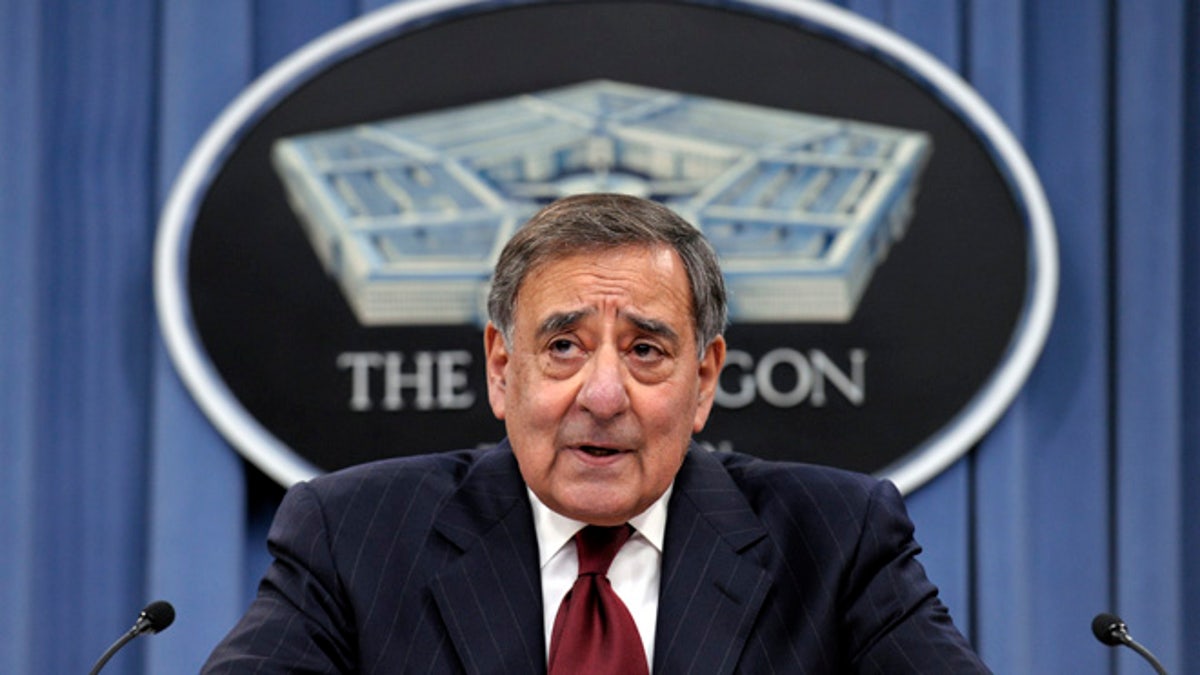
Feb. 13, 2013: Outgoing Defense Secretary Leon Panetta speaks during his last news conference as defense secretary at the Pentagon. (AP)
Animosity between the Pentagon and Congress is growing as top lawmakers signal a willingness to let automatic spending cuts take effect in two weeks, with patience wearing thin among Republicans for another stopgap measure like the one President Obama is advocating.
Congress already delayed the cuts by two months as part of the fiscal-crisis deal. They're now poised to kick in March 1.
Few in Washington actually profess to want these cuts. But, with no bipartisan alternative on the table, the capital at this stage seems divided between those preparing to grin and bear it, and those warning that the reality of the cuts is too grim to bear.
Rep. Rob Bishop, R-Utah, got into a heated exchange Wednesday with Deputy Defense Secretary Ashton Carter, claiming the military has known for a long time the cuts -- or sequestration, as they're known in Washington -- were a possibility but failed to adequately plan for them.
"You are part of the problem," Bishop said. "The silence that was coming out of the Pentagon ... did not help in actually presenting to the American people what this means."
He added: "I'm sorry. There is a lot of blame to go around if we actually have to have sequestration. Don't think you're going to get out of accepting some part of that blame."
Carter defended the Pentagon's planning, saying he alerted Congress last year.
But Rep. Randy Forbes, R-Va., said lawmakers have been kept in the dark until just a few weeks before the cuts are to go into effect. "We heard over and over again when we were asking you guys what's the impact, we were hearing, `We're not doing the planning. You can't plan for chaos,"' Forbes told Gen. Raymond Odierno, the Army's chief of staff.
The committee's top Democrat, Rep. Adam Smith of Washington, urged lawmakers to prevent the cuts. Smith said it is time to stop talking about the impact of the reductions and "take immediate action to stave off the impending disaster that would occur should sequestration be implemented."
Later in the day, outgoing Defense Secretary Leon Panetta complained about the tone in Washington, perhaps in response to the hearing.
"I don't pretend that we always make the right decisions. We make mistakes," he said. "But what I look for are members who are willing to work with us, to try to work our way through some tough issues and be able to find some solutions. We need to find solutions. We can't just sit here and bitch."
Obama's Democratic allies in the Senate were unveiling legislation Thursday to avoid the cuts, by imposing a minimum tax rate on million-dollar incomes and replacing the automatic cuts with cuts to much-criticized farm subsidies and more gradual reductions to the Pentagon budget.
The cuts are scheduled to begin on March 1 and are the result of Congress' failure to trim the deficit by $1.2 trillion over a decade. The Pentagon faces a $46 billion budget reduction through the end of September, and additional cuts would come in future years as long as the sequester remains in effect. The military also has to absorb a $487 billion reduction in defense spending over the next 10 years mandated by the Budget Control Act passed in 2011.
The only apparent way to avert the cuts is to craft legislation that achieves a similar amount of deficit reduction. Obama has urged Congress to, if it cannot pass a long-term package, pass a short-term bill to buy more time.
But Republican leaders, leery of continuing to push off the deadline, have resisted the call for a stopgap. House Speaker John Boehner told The Associated Press in an interview that it's unlikely the Republican-controlled House and Democratic-led Senate will prevent the cuts.
The speaker said that until Obama puts forward a plan to avoid the sequester and Senate Democrats pass it, "we're going to be stuck with it. It's going to be a little bleak around here when this actually happens and people actually have to make decisions."
Boehner noted that while plenty of GOP defense hawks are anxious about the automatic cuts, Democrats concerned with cuts to domestic programs have a lot on the line, too.
Another line-up of agency heads testified Thursday before the Senate Appropriations Committee, warning about the impact of the cuts. Witnesses included Education Secretary Arne Duncan and Homeland Security Secretary Janet Napolitano.
The Pentagon, for instance, would have to furlough civilian employees for up to 22 working days over six months. There would be the equivalent of 5,000 fewer border patrol agents.
The State Department warned it would lose $2.6 billion in department and USAID funds this year. The cuts would mean $200 million less in humanitarian assistance for places like Syria and Somalia, and $300 million less in foreign military financing to U.S. allies such as Israel, Jordan and Egypt. Security at U.S. diplomatic installations, a sensitive issue since the Sept. 11 attack in Benghazi, Libya, would also be affected, as would international peacekeeping operations in Mali and elsewhere and programs combatting terrorism, weapons proliferation and drug trafficking.
Military officials have been conducting a vocal campaign to head off the budget cuts by emphasizing how the reductions will degrade the military's ability to respond to a crisis. The Defense Department announced last week it is cutting its aircraft carrier presence in the Persian Gulf region from two carriers to one, a move that represents one of the most significant effects of the sequester. The U.S. has maintained two aircraft carrier groups in the Gulf for much of the last two years.
At Wednesday's hearing, the service chiefs provided specific example of how the sequester, combined with the lack of a 2013 budget and the long-term reductions, would impact the armed forces.
Odierno said training for Army helicopter pilots would be pared back and that could have deadly consequences in a place like Afghanistan where the rugged terrain and weather conditions makes flying dangerous.
The Navy's top officer said by 2014 he would be unable to send ships to support U.S. Southern Command, which controls U.S. forces operating in Central America, South America and the Caribbean. The Navy also could not fully support counterterrorism operations in Somalia and Yemen, said Adm. Jonathan Greenert, the chief of naval operations.
The Associated Press contributed to this report.




